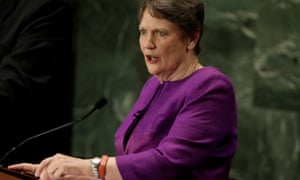As he nears the end of his second five-year term, Ban said that “it’s high time now” for a female secretary general after eight men at the helm.
There are currently 11 candidates vying to succeed Ban: six men and five women.
Ban stressed that the decision was not up to him, but to the 15-member security council, which must recommend a candidate to the 193-member general assembly for its approval.
“We have many distinguished and eminent women leaders in national governments or other organisations or even business communities, political communities, and cultural and every aspect of our life,” Ban said. “There’s no reason why not in the United Nations.”
Without giving any names, he said there were “many distinguished, motivated women leaders who can really change this world, who can actively engage with the other leaders of the world”.
“So that’s my humble suggestion, but that’s up to member states,” Ban said during a visit to the home of 99-year-old Libba Patterson in Novato, California, where he spent his first days in the United States as an 18-year-old student from South Korea.
He praised the general assembly for holding the first ever public hearings for all the candidates seeking to succeed him.
By tradition the job of secretary-general has rotated among regions of the world. Officials from Asia, Africa, Latin America and western Europe have all held the world’s top diplomatic post. East European nations, including Russia, argue that they have never had a secretary general and it is their turn. A group of 56 nations are campaigning for the first female UN chief.
The security council has held two informal polls in which 12 candidates participated, and in each the highest-ranked woman was in third place, a disappointment to many. Antonio Guterres, a former Portuguese prime minister who has also headed the UN refugee agency, topped both polls.
In the first “straw” poll, Irina Bokova of Bulgaria, who heads Unesco, came in third but in the second she dropped to fifth. In the second poll Argentina’s foreign minister Susana Malcorra, who was Ban’s former chief of staff, moved up to third. The former Croatian foreign minister Vesna Pusic, who placed last in the first poll, dropped out.
The three other female candidates are New Zealand’s former prime minister Helen Clark, who heads the UN Development Programme; Christiana Figueres of Costa Rica, the UN official who played a key role in shaping last December’s historic agreement to fight climate change; and the former Moldovan foreign minister Natalia Gherman,
The security council has scheduled another “straw” poll on 29 August and at least one, possibly two, are expected to be held in September.
 Helen Clark, the former New Zealand prime minister, is one of the contenders for UN secretary general. Photograph: Mike Segar/Reuters
Helen Clark, the former New Zealand prime minister, is one of the contenders for UN secretary general. Photograph: Mike Segar/Reuters